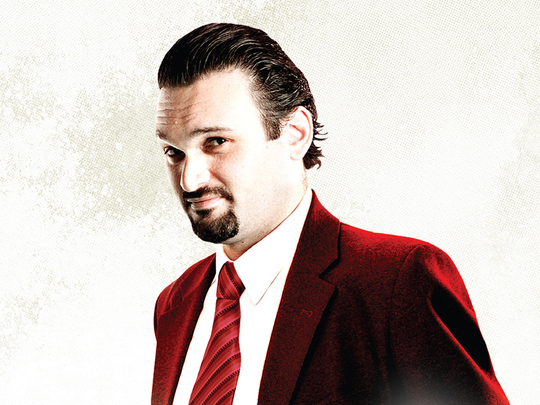
One of the pioneers of stand up comedy in the Middle East with appearances on major TV networks, Nemr Abu Nassar returns to the capital for the second United Nations of Comedy Tour this weekend.
But before the laughs, a moment of gravity: Abu Nasser takes his job very seriously.
“Just because you’re laughing doesn’t mean you’re silly. The people that attend my specials are [expletive]... tired and want a way out. When they attend my shows, they are entering my world and it’s a great responsibility for me to make them feel like they’re a part of my world,” he said.
You’re returning to Abu Dhabi after a successful show last year. What is it about the city that keeps you coming back?
They’re paying me! No, I’m just kidding. I’ve been to Abu Dhabi twice at the National Theatre. I like the crowd. I mean, if you go to Dubai, yes, there are many types of people but I don’t feel like there’s a mixing in the cultures. In Abu Dhabi there’s a more holistic feeling, it feels more homey and there’s an overall identity to the people. I feel welcome here even though it’s an intangible feeling. If each Emirate was a playground, you know, Dubai would be middle school where there are still cliques and groups. Abu Dhabi feels like it has gone to university and came back.
Do you feel a need to censor yourself or tweak your material when you go from Lebanon to the UAE, or from the Middle East to the US?
I think that Lebanon is the most liberal place to perform in. But I don’t do any political or religious material because I don’t believe that there’s a place in the Middle East for this kind of comedy. Weaker comics who have to rely on vulgarity to get a joke going will have a problem going from Lebanon to Dubai. If there is some profanity or sexual innuendo, people won’t laugh unless there is real content. So if your material is smart, you wouldn’t need to do much tweaking. I’m not offensive and I am one of the highest selling artists in the Middle East, because families attend my shows. I am only vulgar when necessary and when I’m trying to bring authenticity to the skit. Of course, the first time I went to Jordan or Saudi Arabia or the UAE, my show was more timid and it got more open, not in terms of censorship, just because I was able to understand the culture.
I noticed that you graduated university with a bachelor’s in finance and a minor in philosophy. How did you transition from that to comedy?
I knew ever since I was four that I want to either become a stand-up comic or a ninja turtle and I still haven’t given up on either one. The backbone of the industry that I am a part of today was still in its developing stages when I first decided to join it. It was being created from less than zero because there were no stages or venues set up for it. A big chunk of my career in the beginning relied on my knowledge of the business industry, things which I wouldn’t have ever learned without my degree in finance. Philosophy on the other hand is just a passion because I love to read. So my comedy is about thinking and analysis, both of which are skills that I’ve learned using my degrees.
Speaking of beginnings, since people didn’t know much about stand-up comedy in the Middle East, how was the response at first and how did it change?
I have never had support. People were always saying, ‘you’re wasting your time, this isn’t going to happen’. This is because I was doing English stand up comedy in the Middle East without mixing religion or politics.
There are only two things standing in your way: willpower and social stigma. I became successful in the Middle East before the US. You can still be whatever you want to be while retaining your values and maintaining your own identity and integrity. If you want to come up with excuses, you will. You’ll say your parents aren’t letting you have something, or that society will shun you or look at your a certain way. To me these are just reasons you make up for yourself to not be what you want to be. I made it big in Lebanon during its worst period. It was fighting a war with Israel then our Prime Minister got assassinated.
What can people expect from your show?
I like to address a range of silly and serious topics. The Middle East is constantly placing people in situations they want to escape and they come to you, a stand-up comic, for that very reason. You can only call yourself a comedian when you perform a special and for about 90 minutes or so, the audience comes into your world and feel like they’re a part of it. Even when they leave, they have to look at their own situations differently, having been influenced by what you’ve given them. It’s a big responsibility and one that I don’t take lightly at all.












